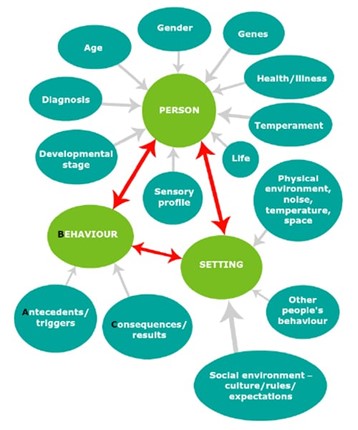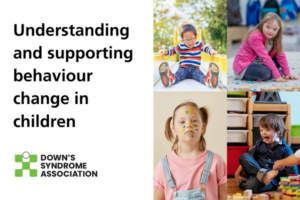Approaching and understanding behaviours with care
Behaviour refers to everything that people do. We all react to situations and communicate through our behaviour.
Behaviour can be positive, helpful and useful to the person. However, behaviour can be problematic to the individual or to other people around them. This is sometimes called maladaptive or challenging behaviour. So-called challenging behaviours are often more extreme versions of quite ordinary behaviours. These behaviours may occur for the first time by chance or by imitating others. The person may continue the behaviour because it is reinforced, or useful to them. We call this learned behaviour.
‘Critically, challenging behaviour is not in itself a characteristic of Down syndrome, and the underlying cause or motivation needs to be addressed.’
(Page 9)
For people who have difficulties with other forms of communication, such as pupils who have Down syndrome, behaviour – the things that they do – can be the most effective form of communication. A person who has Down’s syndrome will usually be stronger in receptive language (understanding) than expressive (verbal) language skills. This can lead to frustration when they can understand but are not able to tell people what they need or want.
Expectations around our behaviour change with age and in different settings. For example, it is fine to run around and kick a ball outside in the playground or garden but not in the classroom. A behaviour becomes a problem when it is limiting a person’s life or when it does not match with expectations in a setting, for instance in a school. Perhaps it is preventing them going to places, socialising, learning and forming relationships with other people. It might be causing harm to them or others around them.
An important part of understanding behaviour is to look at the environmental factors and by this we mean more than the physical environment. We need to look at other people and their behaviour including ourselves as a supporter and consider the rules and expectations and whether they are realistic and consistent. A learner’s health, emotional wellbeing, social inclusion, relationships and experiences at home, school and in the community are all important factors to consider.
The diagram that follows shows the many factors that influence our behaviour and that of the people we care for. You will see that some of these are fixed, for example age – but that others can be changed – expectations or others’ behaviour and reactions. These are the ones we need to use in managing, changing and supporting behaviour positively.

It is important to also recognise that ill-health has an impact on learning, so regular health
checks are recommended for children and young people who have Down’s syndrome, as for any child. It is possible that pain responses might result in behavioural changes.
As the DSi Education Guidelines (Page 9) remind us:
‘Even articulate people with Down syndrome are known to have difficulty expressing the extent of their pain and locating it on their body. Those who are close to the individual might notice behavioural changes, e.g. becoming angry or aggressive, or physical changes, such as pallid skin colour. In an education context, if students exhibit challenging behaviour, it could be that they are in pain and unable to communicate their extreme discomfort. In noting the impact of pain on behaviour, it is important to recognise that there may be many contributing factors that manifest in behavioural changes.’
At the DSA, we have produced a guide to Using Positive Behavioural Support (PBS) for people who have Down’s syndrome, which you can download here. PBS is a person-centred way of supporting people who have a learning disability using the principles of behavioural analysis. It is a collaborative approach that involves focussing on all that is positive whilst keeping the learner’s needs at the heart of all discussions, thinking and planning. The child or young person at the centre of this approach is viewed as an individual who is so much more than a problem behaviour.
We also have a range of resources Supporting Behaviour Positively, which provide detailed guidance for supporting a person’s behaviour with practical resources that take them through the steps. The resources are suitable for both parents and professionals supporting children or adults. These can also be found on our site.
Finally, we are also running a training session on 23 November 2023, which you might be interested in attending:
Understanding and supporting behaviour change
(Click the image for more information and to book)
Alternatively, you may be interested in our Pay per View session on Using Positive Behaviour Support for Change if that is more convenient.
If you are looking for further information on how to support a person’s behavior, please call our free Helpline on 0333 1212 300 or email info@downs-syndrome.org.uk

